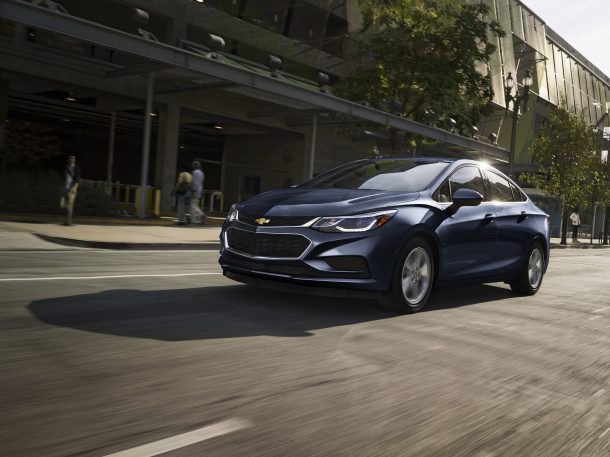Chevrolet Cruze Diesel Captures All the MPGs, on the Highway at Least

General Motors’ PR team and ad writers basically have their taglines and talking points written for them now that the Environmental Protection Agency has released fuel economy ratings for the 2017 Chevrolet Cruze Diesel.
Rumblings from inside the Renaissance Center late last year caused much speculation as to the oil-sipping model’s thriftiness, and we were told GM was shooting for a 50 mile-per-gallon highway rating.
As it turns out, the Cruze crested that bar with room to spare.
Announced by a jubilant GM Monday morning, the EPA has estimated the Cruze’s highway mileage at 52 mpg — when equipped with a six-speed manual transmission, anyway. City economy for that model is a far less exciting 30 mpg, or the same as a gas-powered, automatic transmission model. Combined, it works out to 37 mpg in mixed driving.
When compared to the previous-generation model, the new diesel sees an 8 mpg jump on the highway, and a 5 mpg increase in combined fuel economy. Estimated range, according to GM, is 702 miles.
The nine-speed automatic that gives the gasoline Cruze its marketable 40 mpg highway rating doesn’t work the same magic for the Cruze Diesel, however. EPA estimates for that model ring in at 47 mph highway, 31 mpg city, and the same combined figure as stick shift units. If you’re prone to long road trips, the transmission choice is clear.
While class-leading economy is great, what’s more important to GM — especially in this day and age — is an EPA seal of approval for the Cruze Diesel’s tailpipe emissions. The 1.6-liter turbodiesel apparently passed with flying, or at least satisfactory, colors. As such, the engine’s Tier 3 compliance keeps the engine viable through 2025.
Making 137 horsepower and 240 lb-ft of torque in the Cruze, GM’s new oil burner is also found in the downsized 2018 Equinox. Fuel economy figures for the diesel ‘Nox have not been released.
[Image: General Motors]

More by Steph Willems
Latest Car Reviews
Read moreLatest Product Reviews
Read moreRecent Comments
- The Oracle Honda is generally conservative yet persistent, this will work in one form or fashion.
- Theflyersfan I love this car. I want this car. No digital crap, takes skill to drive, beat it up, keep on going.However, I just looked up the cost of transmission replacement:$16,999 before labor. That's the price for an OEM Mitsubishi SST. Wow. It's obvious from reading everything the seller has done, he has put a lot of time, energy, and love into this car, but it's understandable that $17,000 before labor, tax, and fees is a bridge too far. And no one wants to see this car end up in a junkyard. The last excellent Mitsubishi before telling Subaru that they give up. And the rear facing car seat in the back - it's not every day you see that in an Evo! Get the kid to daycare in record time! Comments are reading that the price is best offer. It's been a while since Tim put something up that had me really thinking about it, even something over 1,000 miles away. But I've loved the Evo for a long time... And if you're going to scratch out the front plate image, you might want to do the rear one as well!
- Ajla So a $10K+ transmission repair?
- Kwik_Shift_Pro4X I've mentioned before about being very underwhelmed by the Hornet for a $50000+ all in price tag. Just wasn't for me. I'd prefer a Mazda CX-5 or even a Rogue.
- MaintenanceCosts Other sources seem to think that the "electric Highlander" will be built on TNGA and that the other 3-row will be on an all-new EV-specific platform. In that case, why bother building the first one at all?


































Comments
Join the conversation
We've owned a number of VW diesels. Turbo and non. The earliest one was, if I recall, a 1981 model, and the last was a 2009. Golfs, Beetles, Rabbits, Jettas. Despite a diesel vehicle being the norm in our driveway for quite a while, the shine has worn off the idea, for us, to a large extent. It's not one single thing, but rather a few factors, for me. Diesel emission systems have become more complex, perhaps a tad more fragile/maintenance intensive/costly. Diesel MPG advances don't seem to have kept pace with the same from gasoline powered cars. 15 years ago, my wife's manual TDI New Beetle delivered far better fuel economy than the same car with a gas engine. It felt faster than the car with the gas engine. There was no DPF or such to worry about. Fuel, back then, had plenty of sulfur in it, so no worries about the fuel pump randomly turning into a grenade due to lack of fuel lubricity. Also, you couldn't walk down the street to the Toyota dealer and get an excellent Prius with even better MPG for reasonable money. I get it, diesel has torque, the power delivery characteristics, etc. Still, I think the case for owning a small diesel passenger car is weaker today than it was a decade and a half ago. A turbo Civic gets you 40+ MPG, is probably quicker than a Cruze diesel, probably more reliable, and likely has better resale. If speed is of no concern and maximum economy is, a Prius will do better on gas and probably outlast a Cruze, despite being aesthetically challenged. I don't know. I'm still a little bit tempted by the Cruze due to the weird factor and the hatch body style, not to mention the MT. But I think it's a relatively hard buy to justify these days when there are a lot of really good, very economical small cars to choose from that probably involve less hassle and less potential downside risk.
Interesting discussion, refreshingly free of idiology. I don't think anyone mentioned the higher energy density of diesel, which should be factored into mileage comparisons.